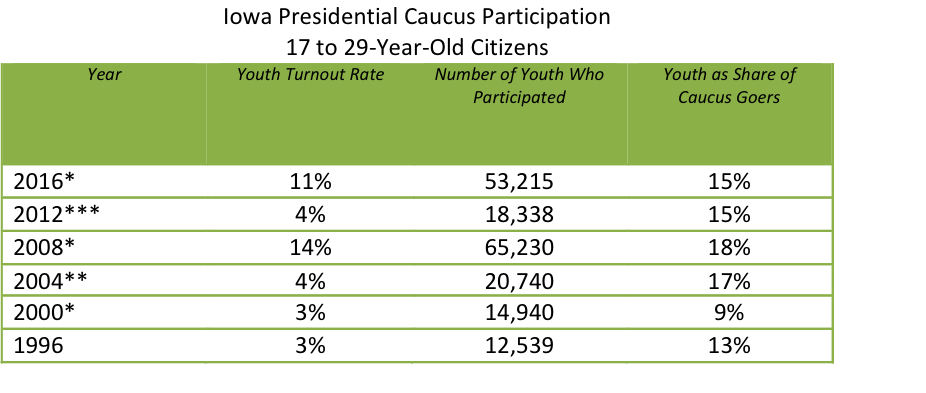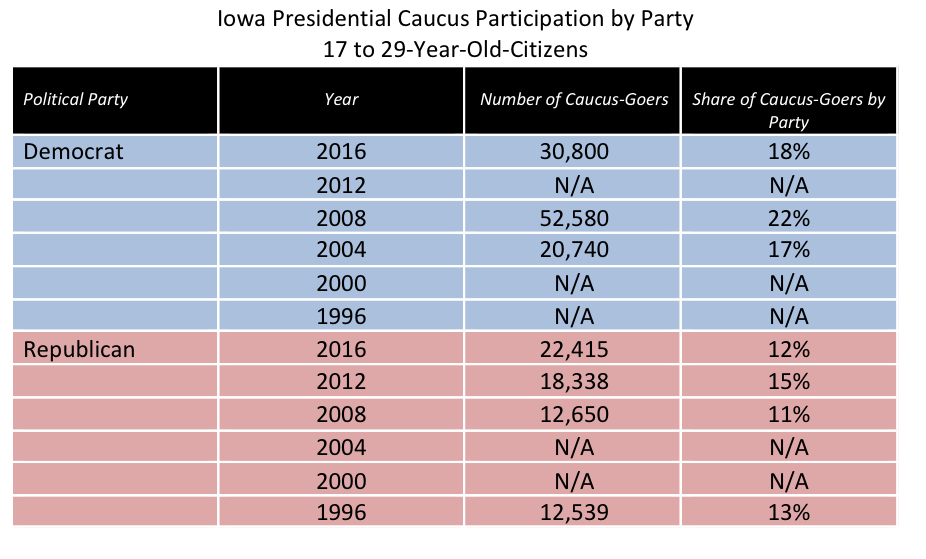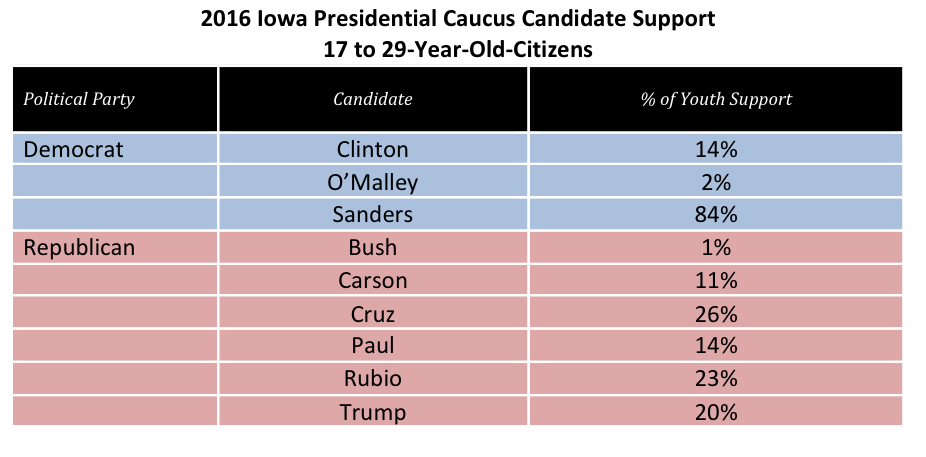Young Iowans Set Record for Republican Caucus Participation while Overall Youth Turnout 11%; Tremendous Youth Support for Sanders Keeps Democratic Iowa Caucus Tight
Eleven percent of young, eligible Iowa citizens participated in last night’s caucuses, according to CIRCLE estimates. Young Democratic caucus-goers showed overwhelming support for Senator Bernie Sanders over Secretary Hillary Clinton, 84% to 14%. Republican caucus winner Senator Ted Cruz drew 26% of the support from young Republican caucus-goers, followed by four other Republican candidates in double-digits.
While data is important for understanding youth participation in the Iowa caucuses, views from the ground are also critical. CIRCLE gathered several reflections from practitioners working with youth in Iowa that provide insight into what efforts—from educators, media and nonprofits—looked like.
High Participation by Young Iowans
Young people made up 15% of total caucus-goers last night for a total estimate of 53,000 young people taking part in the first-in-the-nation ritual. As a result, youth participation in the 2016 caucuses appears to be high, but not higher than that of the 2008 caucuses.
 * Combines the Democratic and Republican figures. For separate results by party, see Table 3
* Combines the Democratic and Republican figures. For separate results by party, see Table 3
**2004 statistics only include the Democratic Caucus. There was no Republican Caucus in 2004, because President George W. Bush was an incumbent and the GOP nomination.
***2012 and 1996 statistics only include the Republican Caucus. In these years, there was/is no Democratic Caucus, because there was an incumbent president from the Democratic Party that took the nomination.
Source: The share of Caucus participants is obtained from the 2016, 2012, 2008, and 2004 IA entrance/exit poll conducted by Edison Research, and the 2000 and 1996 IA entrance/exit poll conducted by Voter News Services. The numbers of votes cast are obtained from the New York Times and the Iowa Democratic Party. The numbers of votes cast in the past election years were obtained from various sources including the Washington Post archives (1996), Federal Election Commission (2000 and 2004), and CNN.com (2008). Estimated voter turnout is obtained by taking the estimated number of votes cast by young people and dividing it by the estimated population of the 17-to-29-year-old citizens from the March Population Supplement of the Current Population Survey, of the year closest to the Caucus.
Comparisons to past years must be made with caution, because turnout is affected by the date of the caucuses and by the nature of the Democratic and Republican presidential campaigns, which are different in every cycle. For example, in 2008 both the Republicans and Democrats held caucuses, but in 2012 only the Republicans held a competitive caucus. The table below provides estimates of youth participation in Iowa caucuses by party and year.
Youth Key to Close Democratic Caucus Results, Spread Support in Republican Caucuses
Young people appear to be at least one of the keys to the very close Democratic results in Iowa. Entrance polls suggest that 84% of young people supported Senator Sanders, a stark contrast to the 65-and-over group, just 26% of whom supported him.
Youth support in the Republican caucuses is distributed across several candidates with no one candidate reaching a plurality, suggesting that all the candidates have more to do to rally young people. According to entrance polls, Senator Ted Cruz drew 26% of the support from young Republican caucus-goers, followed by Senator Rubio (23%), Donald Trump (20%), Senator Paul (14%) and Dr. Carson (11%). Compared to older caucus-goers, young Republicans were less likely to support Mr. Trump, and more likely to support Senator Paul. However, Senator Rand Paul received far less support from youth than his father, former Rep. Ron Paul, who received 48% of youth support in 2012.







